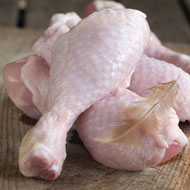Two-thirds of raw chicken positive for ESBL-producing E. coli

'...the ESBLs found did not include CTX-M-15, which is the predominant ESBL in E. coli causing disease in humans in the UK and worldwide.'
New research shows two-thirds of raw chicken samples (65.4 per cent) bought at retailers across the UK have tested positive for ESBL-producing E. coli.
Carried out by researchers from the APHA and Public Health England, it is the largest study of its kind in the UK, seeking cephalosporin-resistant and carbapenem-resistant E. coli in retail meat.
Writing in the International Journal of Food Microbiology, authors report a much higher proportion of UK-labelled chicken meat containing ESBL-producing E. coli than previously thought.
CTX-M types are the most common ESBLs in E. coli from farm animals in Europe; they confer resistance to cephalosporin antibiotics and are therefore a public health concern.
Researchers collected 397 samples of raw meat (beef, pork and chicken) from five regions of the UK; East Anglia, London, North West England, Scotland and Wales. The samples were obtained from five leading supermarkets, as well as discount stores, convenience stores and local butchers. In addition, 400 samples of fruits and vegetables were bought.
The majority of meat samples (80.9 per cent) were labelled as coming from Britain, though this could mean the animals were reared elsewhere and the meat packaged in Britain.
In total, 27.5 per cent of meat samples tested positive for ESBL-producing E. coli. Fewer chicken samples from Scotland and Wales tested positive (40.6 and 53.1 per cent respectively), compared with the three English regions (75-80.6 per cent). Overall, 85.6 per cent of ESBL-positive chicken samples were positive for CTX-M-1.
However, just two per cent of beef and pork, and no fruits and vegetables tested positive. In addition, no carbapenem-resistant E. coli was isolated from any of the samples.
Researchers say the data clearly show raw chicken is currently the most significant known food source of ESBL-producing E. coli, to which the UK population is frequently exposed. This situation could change and, therefore, requires surveillance.
However, they stress that the results relate to raw meat and thorough cooking will destroy any bacteria, regardless of whether it is antibiotic-resistant.
As such, they wrote: '… although raw chicken undoubtedly represents a source of ESBL-producing E. coli, it seems that this does not translate into a major public health problem in the UK; the ESBLs found did not include CTX-M-15, which is the predominant ESBL in E. coli causing disease in humans in the UK and worldwide.'
Commenting on the paper, a government spokesperson said: "This study by Public Health England concluded that this type of E. coli does not represent a major public health risk in the UK – a view supported by the Food Standards Agency…
"We take both food safety and antibiotic resistance very seriously. This is why we support the work of the FSA to make sure our food is safe, and why we are working with countries around the world to reduce antibiotic use in people and animals."



 The Veterinary Medicines Directorate (VMD) is inviting applications from veterinary students to attend a one-week extramural studies (EMS) placement in July 2026.
The Veterinary Medicines Directorate (VMD) is inviting applications from veterinary students to attend a one-week extramural studies (EMS) placement in July 2026.